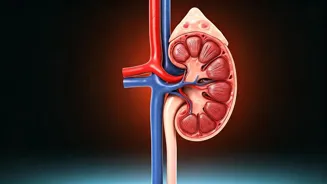Excessive Painkillers Use
Overuse of over-the-counter pain relievers, like ibuprofen and naproxen, can significantly harm the kidneys. These medications, though effective for pain relief,
can reduce blood flow to the kidneys, potentially leading to kidney damage, especially with regular use. People using these drugs frequently or in high doses must be cautious and consult with a healthcare professional. Alternatives and proper usage guidelines are essential for mitigating risks. Consider the potential impact on kidney function before popping that pill, especially if experiencing chronic pain. It's crucial to be mindful of dosage and frequency to protect kidney health. Regular check-ups and awareness of any existing kidney issues are also important.
Insufficient Water Intake
Dehydration is a sneaky threat to kidney health. When the body lacks sufficient water, the kidneys struggle to function optimally. This inadequate fluid intake can lead to the accumulation of toxins and waste products, which can cause kidney damage. Ensuring that one drinks enough water throughout the day is a simple yet powerful way to prevent potential issues. The amount of water needed varies depending on factors like activity level and climate, but generally, aim for consistent hydration. Make water consumption a conscious part of your daily routine. Keep water bottles handy to stay hydrated, especially during physical activity or in hot weather. Staying hydrated is essential for optimal kidney performance and overall health.
Excessive Salt Consumption
High salt intake can elevate blood pressure, putting extra strain on the kidneys. The kidneys work tirelessly to filter and regulate blood, and increased blood pressure complicates this process. Consuming large amounts of sodium from processed foods, fast food, and salty snacks can lead to kidney issues over time. Reducing salt in your diet is a critical step in protecting kidney health. Read food labels carefully to understand sodium content and choose low-sodium options. Minimize the use of salt during cooking and flavor meals with herbs and spices. Making mindful dietary choices can lessen the workload on your kidneys, promoting long-term health. Be aware of your daily salt consumption, and gradually reduce it for lasting benefits.
Eating Too Much Processed Food
Processed foods often contain high levels of sodium, phosphorus, and other substances that can be harmful to the kidneys. The kidneys filter waste products, and a diet rich in processed items can overload this system. Regular consumption of processed foods can cause kidney damage. The ingredients in processed foods are frequently difficult for the kidneys to handle, raising the risk of complications. Prioritizing fresh, whole foods is the key to a kidney-friendly diet. Embrace a diet centered on fruits, vegetables, lean proteins, and whole grains. Reducing processed food intake not only benefits kidney health but also enhances overall well-being. Cooking more meals at home gives you control over what you eat, helping to make healthier choices.
Frequent Alcohol Consumption
Excessive alcohol consumption can damage the kidneys and increase the risk of chronic kidney disease. Alcohol can affect kidney function and interfere with the kidneys' ability to filter blood effectively. Regular, heavy drinking puts significant stress on the kidneys, which can lead to permanent damage. Limiting or avoiding alcohol is a key step in preserving kidney health. If you choose to drink alcohol, do so in moderation, adhering to recommended guidelines. Consider non-alcoholic alternatives, and ensure adequate hydration, especially when consuming alcohol. Being mindful of alcohol intake is crucial for maintaining kidney health and avoiding long-term risks.
Not Getting Enough Sleep
Consistent lack of sleep can negatively impact kidney health. Sleep disturbances can disrupt the body's natural processes, including those related to kidney function. When the body doesn't get enough rest, there may be an impact on the kidneys. Ensuring you have sufficient sleep is important for overall health, which includes kidney health. Aim for 7-8 hours of quality sleep each night. Establish a regular sleep schedule and create a relaxing bedtime routine. The kidneys repair and regenerate themselves during sleep, making rest essential for optimal function. Prioritizing sleep is an easily achievable strategy to support kidney health.
Ignoring Medical Conditions
Failing to manage chronic conditions like diabetes and high blood pressure can significantly impact kidney health. Uncontrolled diabetes and hypertension can gradually damage the kidneys over time. Regular monitoring and medication adherence are essential for managing these conditions and protecting the kidneys. Work closely with healthcare providers to control these conditions through medication, lifestyle adjustments, and regular check-ups. Early detection and management of diseases can prevent long-term kidney damage. By addressing these underlying health issues, you can significantly improve your kidney health and overall well-being. Make a commitment to taking proactive steps to care for your body and improve kidney function.













